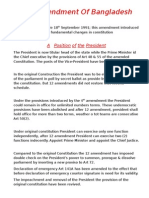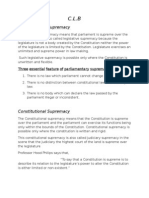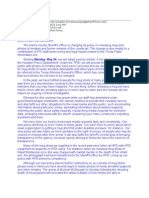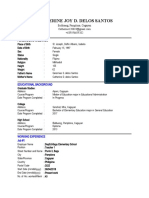0 ratings0% found this document useful (0 votes)
354 viewsWill
Will
Uploaded by
Md. Mahbubul KarimA will allows a person to dictate how their property is distributed after their death. It must be made by a mentally sound, solvent adult or minor whose will takes effect after reaching majority. A will can bequeath up to 1/3 of the testator's property and cannot designate an heir without consent. It takes written or oral form and can be revoked during the testator's lifetime. A will takes legal effect after death unlike a gift.
Copyright:
Attribution Non-Commercial (BY-NC)
Available Formats
Download as PPT, PDF, TXT or read online from Scribd
Will
Will
Uploaded by
Md. Mahbubul Karim0 ratings0% found this document useful (0 votes)
354 views19 pagesA will allows a person to dictate how their property is distributed after their death. It must be made by a mentally sound, solvent adult or minor whose will takes effect after reaching majority. A will can bequeath up to 1/3 of the testator's property and cannot designate an heir without consent. It takes written or oral form and can be revoked during the testator's lifetime. A will takes legal effect after death unlike a gift.
Original Description:
will
Copyright
© Attribution Non-Commercial (BY-NC)
Available Formats
PPT, PDF, TXT or read online from Scribd
Share this document
Did you find this document useful?
Is this content inappropriate?
A will allows a person to dictate how their property is distributed after their death. It must be made by a mentally sound, solvent adult or minor whose will takes effect after reaching majority. A will can bequeath up to 1/3 of the testator's property and cannot designate an heir without consent. It takes written or oral form and can be revoked during the testator's lifetime. A will takes legal effect after death unlike a gift.
Copyright:
Attribution Non-Commercial (BY-NC)
Available Formats
Download as PPT, PDF, TXT or read online from Scribd
Download as ppt, pdf, or txt
0 ratings0% found this document useful (0 votes)
354 views19 pagesWill
Will
Uploaded by
Md. Mahbubul KarimA will allows a person to dictate how their property is distributed after their death. It must be made by a mentally sound, solvent adult or minor whose will takes effect after reaching majority. A will can bequeath up to 1/3 of the testator's property and cannot designate an heir without consent. It takes written or oral form and can be revoked during the testator's lifetime. A will takes legal effect after death unlike a gift.
Copyright:
Attribution Non-Commercial (BY-NC)
Available Formats
Download as PPT, PDF, TXT or read online from Scribd
Download as ppt, pdf, or txt
You are on page 1of 19
Meaning and definition of Will
The Arabic synonym of will is Wasiyat. A
will is an instrument by which a person
makes the disposition of his property to
take effect after his death. A document
embodying the will is called wasiyat-
nama.
Many jurists have given several
definitions of will-
According to Durrul Mukhtar- “Will is an
assignment of property to take effect
after one’s death.”
According to Tyabji- “The legal declaration of
the intentions of a Muslim with respect to his
property, which he desires to be carried into
effect after his death.”
According to sec. 2 of the Succession Act
1925-'Will is the legal declaration of the
intention of a testator with respect to his
property which he desires to be carried into
effect after his death.'
Form of Will
Written form and registration aren't
necessary for the validity of a Will. In
Muslim law a will may be made either
orally or in writing.
However to have proper evidence, the
Will should be made in writing. If the Will
is in writing it need not be signed and if
signed, it need not be attested. The main
thing is that the intention of the testator
must be clear.
Who can make a will?
A Muslim who is of sound mind,
solvent and is major can make a
will. Under Muslim Law majority is
presumed to be attained at puberty,
which is supposed to be reached at
15 years of age. But Majority Act
1875 recognizes only the age of 18
as majority not 15 for the purpose
of will.
A minor may make a will but its validity
would be postponed to the event when, after
attaining majority, he rectifies it. Such a will is
very weak as it may be attacked on the
grounds that it has been made under force,
coercion or undue influence.
To whom a Will can be
made?
i. Any person who is capable of holding
property.
ii. Unborn person can not be a legatee.
However if the legatee is in the womb and
the birth takes place within six months
from the date of making the will, he can be
a lawful legatee.
iii. Heirs can not be the legatees. This
rule is relaxed only in cases, where
other heirs give their consent. By
giving consent, an heir can bind his
own share but not of others. It is
essential that the heir must be in
existence at the time of testator's
death.
iv. Will can be made for religious or
charitable purpose
What can be bequeathed?
The subject matter of will may be-
The corpse or body of a testator,
which must be in existence at the
time of the testator's death, and may
not be in existent at the time of
making the will.
The usufruct of an existing property
for a limited time or for life time of
the legatee. It is permissible that the
corpus may be given to one person
and the usufruct of the same property
to another.
The vested remainder- Suppose A
bequeaths the usufruct of a property to
B, for B's lifetime, and the whole of
property to C. C has vested remainder
in the property.
How much can be bequeathed?
No Muslim can bequeath more than one-third
of his property. The one-third is calculated
after deducting any debts, and funeral
expenses of the testator.
If the will exceeds the bequeathable one-
third, it doesn't take effect without the
consent of the heirs. By giving consent, an
heir can bind his own share but not of others.
But if the heirs do not give consent, in Hanafi
law the bequests shall be rateably reduced or
abated. The principle is called Abatement of
legacies. The Shia law however does not
recognize it.
If wills for pious purposes exceed the
legal limit of one third, the property will
be determined in the following order:
bequest for farz i.e., those duties
which are made obligatory by the Holly
Quran, e.g., performance of haz;
ii. bequest for wajibat i.e., those acts that
are recommended by the Quran, but are
not obligatory, e.g. charity on breaking
the day of fast;
iii. bequest for nawfil i.e., voluntary but
pious acts which are not even
recommended, e.g., building a bridge or
mosque.
Bequest of the first class takes
precedence over that of second; and
bequest of the second class takes
precedence over that of the third.
Reasons for limiting: the
testamentary power
There are two limits on a Muslim's power
to bequeath –
for a person- he can't bequeath to an
heir, and
As to property- he can't bequeath more
than one-third of his property. The
reason for this is to prevent a testator
from depriving the heir in getting
property according to law.
Wills during maraz-ul-maut
A gift made in maraz-ul-maut
takes effect as a will. Under
Hanafi law, it takes effect to the
extent of bequethable third, if it
is not in favour of the heirs, and
the possession has been taken by
the donees. Under Shia law, it
takes effect to the extent of 1/3,
even if it is in favour of heirs. But
possession is to be transferred.
According to Fyzee and Mulla, to
constitute maraz-ul-maut there
must be (1) proximate danger of
death, (2) apprehension in the
mind of the sick and (3) some
external indicia, like inability to
attend to routine work etc. But
nothing is conclusive, it is a
question of fact.
A gift by way of will during maraz-
ul-maut must comply with two
conditions – i. the limit of one-third
and ii. If made to an heir, the
consent of other heirs is required.
Revocation of a will
The testator may revoke a will either
expressly or impliedly or by a subsequent
will.
Express revocation- An express revocation
is one where the testator revokes the
bequest in express terms either orally or in
writing.
Implied revocation- Implied revocation is
one where the testator does an act from
which revocation is inferred. For example,
bequest of a piece of land is revoked, if the
testator subsequently builds a house upon
it.
Subsequent Will- Where a testator
makes a will, and by a subsequent
will gives the same property to
someone else, the prior bequest is
revoked. But a subsequent bequest
though it be of the same property,
to another person in the same will
doesn't operate as revocation of the
prior bequest, and the property will
be divided between the two legatees
in equal shares.
Differences between gift and will
Gift Will
Existence of - Not essential at the time of
property at the time will, but must at the time of
of time of gift is death of the testator.
must. - Not done, property
Transfer of devolves upon the legatee
possession at the after death of testator.
time of gift is must. - Becomes effective after
Transfer becomes the death of the testator.
effective instantly. - Does not apply.
Doctrine of mushaa
applies.
Differences between gift and will
No limit as to - Two limits- not more
quantum or than 1/3 and not to
beneficiary heir (subject to
consent).
No revocation of a May be revoked
completed gift. before the death of
the testator.
You might also like
- Sample Debt Validation LetterDocument2 pagesSample Debt Validation LetterJrVilla Malo Boo Michael100% (3)
- 160000MT White Sugar Cane Tender On Edition 2Document31 pages160000MT White Sugar Cane Tender On Edition 2KoMoLoKo100% (1)
- Family FinalDocument20 pagesFamily FinalSHASHI BHUSHAN CHOUDHARYNo ratings yet
- H22N Series 201508Document2 pagesH22N Series 201508TRIINETNo ratings yet
- Will Under Muslim LawDocument12 pagesWill Under Muslim LawMonika GaurNo ratings yet
- Concept of Will Under Muslim LawDocument5 pagesConcept of Will Under Muslim Lawsohan h m sohan h mNo ratings yet
- Theft Robbery DacoityDocument5 pagesTheft Robbery DacoityNARINDERNo ratings yet
- Unit 2 - Orgnaized and UnorganizedDocument6 pagesUnit 2 - Orgnaized and Unorganizedanushiya mNo ratings yet
- 9 Specific Relief Act, 1877Document20 pages9 Specific Relief Act, 1877mostafa faisalNo ratings yet
- Foster CareDocument25 pagesFoster CareJeddy LNo ratings yet
- Assignment On Property Law: TOPIC - Concept of Transfer of Actionable Claim Under Transfer of Property Act, 1882Document6 pagesAssignment On Property Law: TOPIC - Concept of Transfer of Actionable Claim Under Transfer of Property Act, 1882Sourav BhattacharjeeNo ratings yet
- Meaning and Definition of GiftDocument12 pagesMeaning and Definition of GiftAbdul Basit QaziNo ratings yet
- Q.2 Title & FactsDocument17 pagesQ.2 Title & FactsYaseen NarejoNo ratings yet
- Law of AdoptionDocument9 pagesLaw of AdoptionKumar MangalamNo ratings yet
- Project of Transfer of Property ActDocument25 pagesProject of Transfer of Property ActprabhatNo ratings yet
- 382what Is The Order of Succession Among Agnates and Cognates As Per Indian LawDocument3 pages382what Is The Order of Succession Among Agnates and Cognates As Per Indian LawAman RoyNo ratings yet
- Federalism ProjectDocument17 pagesFederalism Projectlokesh4nigamNo ratings yet
- of Unjust EnrichmentDocument16 pagesof Unjust EnrichmentRutuja BachhavNo ratings yet
- Dickinson V SolarDocument4 pagesDickinson V SolarDonvidachiye Liwag CenaNo ratings yet
- Topic: Hiba: Hiba:-Hiba (Tamlik Al Ain) Is "An Act of Bounty by Which A Right ofDocument10 pagesTopic: Hiba: Hiba:-Hiba (Tamlik Al Ain) Is "An Act of Bounty by Which A Right ofsparsh lalNo ratings yet
- Hindu Inheritance Law PDFDocument9 pagesHindu Inheritance Law PDFMohammed AminNo ratings yet
- Family Law - 1 FairfieldDocument130 pagesFamily Law - 1 FairfieldRahul TambiNo ratings yet
- Assignment CompanyDocument6 pagesAssignment Companyسيتي نورقشميNo ratings yet
- TPA Assignment.. Shashwat Srivastava.. 1020171828Document20 pagesTPA Assignment.. Shashwat Srivastava.. 1020171828Rahul manglaNo ratings yet
- Duties and Rights of AgentDocument2 pagesDuties and Rights of AgentnishmaNo ratings yet
- Possession: 1) MeaningDocument6 pagesPossession: 1) MeaningHyder KhanNo ratings yet
- Administrative Tribunals in Bangladesh: An Appraisal On Establishment and ProcedureDocument18 pagesAdministrative Tribunals in Bangladesh: An Appraisal On Establishment and ProcedureKUMAR SUSMITNo ratings yet
- A Comparitive Study On Inevitable Accident and Act of GodDocument9 pagesA Comparitive Study On Inevitable Accident and Act of GodAkash JNo ratings yet
- Family Law DanishDocument12 pagesFamily Law DanishAbhinandan SharmaNo ratings yet
- State Succession Under International LawDocument7 pagesState Succession Under International LawPRAKASH CHANDRA RAYNo ratings yet
- Transper of PropertyDocument25 pagesTransper of Propertynitin0010No ratings yet
- Wills Under Muslim LawDocument22 pagesWills Under Muslim LawRajeev SharmaNo ratings yet
- A. Preventive Relief: 1. INJUNCTIONS (O. 29 RHC 2012)Document16 pagesA. Preventive Relief: 1. INJUNCTIONS (O. 29 RHC 2012)syakirahNo ratings yet
- Kidnapping and Abduction: Indian Penal CodeDocument26 pagesKidnapping and Abduction: Indian Penal CodeRahul TambiNo ratings yet
- The Problem of Juvenile Drugs Use - LegalDocument9 pagesThe Problem of Juvenile Drugs Use - LegalRAKESH KUMAR BAROI100% (1)
- Disadvantages of Using ADRDocument2 pagesDisadvantages of Using ADRTarang SarawgiNo ratings yet
- DPC Gift DeedDocument9 pagesDPC Gift DeedshwetaskasbeNo ratings yet
- Actionable CLAIMDocument7 pagesActionable CLAIMShivam AnandNo ratings yet
- Airport Handling: Detail Process and Procedure of EmbarkationDocument11 pagesAirport Handling: Detail Process and Procedure of Embarkationsakshi kathaitNo ratings yet
- PrenuptialDocument5 pagesPrenuptialISLAMIC LIBRARY100% (1)
- Hindu Law End TermDocument18 pagesHindu Law End TermVibhu TeotiaNo ratings yet
- Research Proposal-Upasana Shetty PDFDocument8 pagesResearch Proposal-Upasana Shetty PDFUpasana Shetty0% (1)
- Mitakshara & DayabhagaDocument14 pagesMitakshara & Dayabhagadevang kaimathiyaNo ratings yet
- Reopening of PartitionDocument14 pagesReopening of PartitionGangaNo ratings yet
- Contingent ContractDocument9 pagesContingent ContractAli ShahNo ratings yet
- Explain The Modes of Acquisition of PossessionDocument2 pagesExplain The Modes of Acquisition of PossessionaparnadbpurNo ratings yet
- Karta's Power of AlienationDocument10 pagesKarta's Power of Alienationkriti mishra0% (1)
- Transfer by Ostensible Owner (Section 41)Document9 pagesTransfer by Ostensible Owner (Section 41)AN HadNo ratings yet
- 3 Essential Conditions GiftDocument13 pages3 Essential Conditions GiftPMG KarachiNo ratings yet
- Transfer of Property Act, 1882: - Ekta Rose Assitant Prosfessor (Als)Document40 pagesTransfer of Property Act, 1882: - Ekta Rose Assitant Prosfessor (Als)dchoraiaNo ratings yet
- V.Madhumitha, Asst Professor, Chennai DR - Ambedkar Govt Law College, PudupakkamDocument8 pagesV.Madhumitha, Asst Professor, Chennai DR - Ambedkar Govt Law College, Pudupakkammohanapriya k100% (1)
- Capacity of PartiesDocument19 pagesCapacity of PartiesTracy Miller100% (1)
- Right To Maintenance Under Various Personal LawDocument36 pagesRight To Maintenance Under Various Personal LawNandini TarwayNo ratings yet
- Court Visit AssignmentDocument2 pagesCourt Visit AssignmentLiv AzzahraNo ratings yet
- Difference Between Realism and Neo-RealismDocument2 pagesDifference Between Realism and Neo-RealismMusaib SharifNo ratings yet
- Capacity of PartiesDocument19 pagesCapacity of PartiesMd. Shadman Sakib 1610973630No ratings yet
- Essential Characteristics of A Valid OfferDocument8 pagesEssential Characteristics of A Valid OfferKOSHLESH BHARDWAJNo ratings yet
- Muslim WillDocument4 pagesMuslim WillAdan Hooda100% (1)
- WasiyatDocument13 pagesWasiyatAjit Anand100% (3)
- Law of Will (Muslim Law)Document7 pagesLaw of Will (Muslim Law)kuku_29No ratings yet
- Assignment IplDocument7 pagesAssignment Iplsa0126627No ratings yet
- Concept of Will Under Muslim LawDocument8 pagesConcept of Will Under Muslim LawMohammad Rehan SiddiquiNo ratings yet
- 202004021930365160rksingh - Law of WillDocument6 pages202004021930365160rksingh - Law of Willvicky kumar rajNo ratings yet
- Anwar Hussain Vs Bangladesh or 8th Amendment CaseDocument3 pagesAnwar Hussain Vs Bangladesh or 8th Amendment CaseMd. Mahbubul Karim87% (15)
- 12 Amendment in Bangladesh ConstitutionDocument3 pages12 Amendment in Bangladesh ConstitutionMd. Mahbubul Karim80% (5)
- Equity MaximDocument6 pagesEquity MaximMd. Mahbubul Karim91% (11)
- ConstitutionDocument3 pagesConstitutionMd. Mahbubul Karim86% (7)
- Criminal Court of BangladeshDocument2 pagesCriminal Court of BangladeshMd. Mahbubul Karim100% (12)
- Ordinance Makeing Power & History in Sub-ContenentDocument2 pagesOrdinance Makeing Power & History in Sub-ContenentMd. Mahbubul Karim100% (2)
- Parlemantary & Constitutional SupremacyDocument2 pagesParlemantary & Constitutional SupremacyMd. Mahbubul Karim100% (8)
- Feature of The Constitution of BangladeshDocument2 pagesFeature of The Constitution of BangladeshMd. Mahbubul Karim86% (14)
- Reporting On Children's Issues Bahm 121 Ass 1Document4 pagesReporting On Children's Issues Bahm 121 Ass 1courage mariyaNo ratings yet
- Research 2 Request Letter FinalDocument6 pagesResearch 2 Request Letter FinalJacqueline Acera BalingitNo ratings yet
- Oman PIL AssignmentDocument6 pagesOman PIL Assignmentanon_909832531No ratings yet
- Anthony Pusateri, Jr. v. Frank C. Johnston, 398 F.2d 327, 3rd Cir. (1968)Document3 pagesAnthony Pusateri, Jr. v. Frank C. Johnston, 398 F.2d 327, 3rd Cir. (1968)Scribd Government DocsNo ratings yet
- Program CERC2020 Final 07.11.2020Document24 pagesProgram CERC2020 Final 07.11.2020Andrei ȘoldanNo ratings yet
- Active Directory Pentest Course 1705144142Document10 pagesActive Directory Pentest Course 1705144142mansiraval262No ratings yet
- Signs Signals BarricadesDocument11 pagesSigns Signals BarricadesNauman AbbasiNo ratings yet
- Mepco Online BillDocument2 pagesMepco Online BillMukhtar AhmedNo ratings yet
- Pushya AbhishekDocument4 pagesPushya AbhishekLeena PurohitNo ratings yet
- Board of Engineers Malaysia (BEM)Document5 pagesBoard of Engineers Malaysia (BEM)Thevhan MurallyNo ratings yet
- Multicultural Diversity: A Challenge To Global TeachersDocument22 pagesMulticultural Diversity: A Challenge To Global TeachersGeorgeEchevarriaNo ratings yet
- CPF Families Briefing Paper - Short VersionDocument6 pagesCPF Families Briefing Paper - Short VersionnasNo ratings yet
- ProvisionsDocument9 pagesProvisionsNEVIL DALENo ratings yet
- Ch10 Installment PurchaseDocument4 pagesCh10 Installment PurchaseAqmarRahmatNo ratings yet
- Kabaddi Score Sheet 1Document1 pageKabaddi Score Sheet 1Shubham Agrahari -Physics EducatorNo ratings yet
- Compensation & Reward ManagementDocument227 pagesCompensation & Reward ManagementjitendersharmajiNo ratings yet
- 24-11-2023-M Cadet Selection CriteriaDocument3 pages24-11-2023-M Cadet Selection CriteriaCOVID-19 updateNo ratings yet
- People v. Melissa ChuaDocument1 pagePeople v. Melissa ChuaElaine Belle OgayonNo ratings yet
- Mugshot LetterDocument2 pagesMugshot LetterT.L. LangfordNo ratings yet
- Isai Lopez-Hernandez, A046 620 341 (BIA Sept. 1, 2017)Document9 pagesIsai Lopez-Hernandez, A046 620 341 (BIA Sept. 1, 2017)Immigrant & Refugee Appellate Center, LLC100% (1)
- Reduction To Standard Logical FormDocument3 pagesReduction To Standard Logical FormDharmendra KumarNo ratings yet
- Cultural Activities: Vocal Solo and Duet Competitions GuidelinesDocument3 pagesCultural Activities: Vocal Solo and Duet Competitions GuidelinesChristine May Sevilleno100% (1)
- RCC CV Final FormatDocument2 pagesRCC CV Final FormatCatherine Joy Delos SantosNo ratings yet
- Fundamentals of Law Office Management 5Th Edition Nollkamper Test Bank Full Chapter PDFDocument22 pagesFundamentals of Law Office Management 5Th Edition Nollkamper Test Bank Full Chapter PDFDeborahBenjaminjgdk100% (17)
- Case 017 Nte A5 Absenteeism Daniel Tomas 09142022Document1 pageCase 017 Nte A5 Absenteeism Daniel Tomas 09142022NcfPrime RecruitmentNo ratings yet
- Consolidation Model - Exercise 1Document7 pagesConsolidation Model - Exercise 1subhash dalviNo ratings yet
- Best College For Electropathy and Catering CoursesDocument3 pagesBest College For Electropathy and Catering CoursesRutvij AGNo ratings yet

































































































